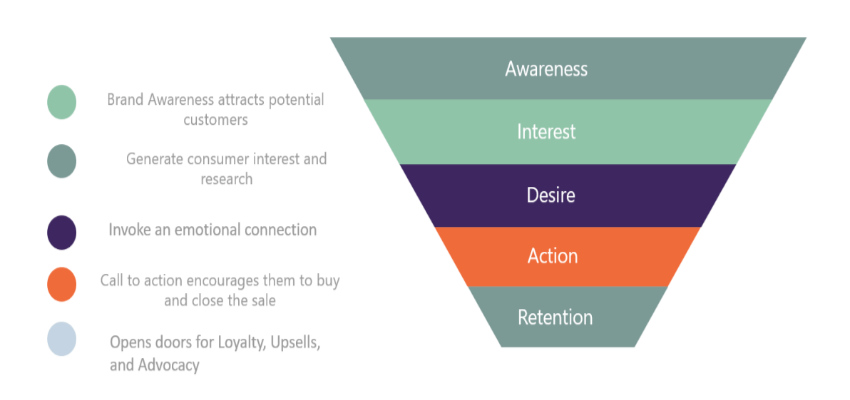Show:
Marketing Funnel Vs. Sales Funnel
Gone are the days when the sales team could simply rely on marketing to deliver hot leads, and closing deals was a relatively straightforward process. The dynamics between marketing and sales have evolved significantly, and the buyer’s journey has become more complex, blurring the lines between their roles. Today, the relationship-building process requires functional overlap, demanding collaboration between these two critical functions.

While marketing and sales funnels are closely related, it is essential to recognize their distinct roles in the modern business landscape. The confusion arises because both functions are intricately intertwined, with marketing encompassing various commercial activities, including sales as a core component. Marketing’s purpose is to generate interest, awareness, and demand for products or services, laying the groundwork for the sales process. Through branding, advertising, content creation, and lead generation efforts, marketing aims to attract potential customers and steer them toward the sales pipeline.
On the other hand, sales teams are responsible for engaging with prospects directly, understanding their specific needs, addressing concerns, and ultimately guiding them through the final stages of the buyer’s journey to make a purchase decision. Their role is more hands-on, involving personalized interactions, relationship-building, and negotiation to close deals successfully.
As per Reise Digital, despite their differences, marketing, and sales converge in one crucial aspect: the funnel. Both functions work together within the same sales funnel, aiming to convert prospects into loyal customers. The marketing funnel represents the early stages of the buyer’s journey, starting from creating brand awareness to generating leads. As prospects progress through the funnel, marketing hands over qualified leads to the sales team, who then continue the journey, nurturing relationships and guiding the prospects toward the point of sale.
While this convergence can create challenges in differentiating between marketing and sales efforts, it also highlights the importance of alignment and collaboration between the two functions. Effective communication and feedback loops are vital for refining strategies, optimizing the buyer’s journey, and achieving organizational goals.
What Is A Marketing Funnel?
A marketing funnel is a conceptual model that illustrates the customer’s journey from initial awareness of a product or service to making a purchase decision. It represents the various stages a potential customer goes through, starting from awareness, interest, consideration, and intent, ultimately leading to conversion and retention. The funnel helps marketers understand and optimize their strategies at each stage to effectively attract, engage, and convert prospects into loyal customers. It serves as a valuable framework for guiding marketing efforts, nurturing leads, and improving overall sales and customer retention.
What Is A Sales Funnel?
A sales funnel is a visual representation of the customer journey in the sales process. It illustrates the various stages a prospect passes through from initial contact to final purchase. The funnel typically includes stages like awareness, interest, consideration, and decision-making. As prospects move down the funnel, the number of potential customers decreases, and only the most qualified leads remain. The sales funnel helps businesses understand and optimize the sales process, identify potential bottlenecks, and implement strategies to convert prospects into paying customers effectively.

Difference In Use Cases Between Marketing & Sales Funnel
The marketing funnel and the sales funnel are two essential frameworks that guide businesses in their customer acquisition and conversion strategies. While they both share the common goal of driving revenue and growth, they serve distinct purposes in the overall customer journey. Here are a few prominent differences:
1. Lead Generation
At the top of the marketing funnel, the primary focus is on lead generation. Marketing efforts aim to attract a broad audience and raise awareness about the company’s products or services. Through various channels like social media, content marketing, and advertising, potential customers are enticed to engage with the brand. The goal is to capture the attention of prospects and convert them into leads by encouraging them to sign up for newsletters, download gated content, or subscribe to the company’s blog.
Once marketing generates leads, the sales funnel takes over. The sales team focuses on lead qualification and nurturing. They reach out to the generated leads, identify their specific needs, and determine their level of interest and readiness to purchase. The sales funnel aims to separate qualified leads from uninterested prospects and guide the former further down the funnel toward conversion.
2. Nurturing Prospects
As prospects move from awareness to interest and consideration, marketing plays a crucial role in nurturing their engagement. Through targeted email campaigns, personalized content, and automated follow-ups, marketing keeps prospects engaged and builds trust with the brand.
Once a lead is qualified and shows genuine interest, the sales funnel takes over the nurturing process with more personalized and direct interactions. The sales team aims to build strong relationships with potential customers, address objections, and instill confidence in their purchase decision.
3. Educating Customers
In the marketing funnel, the focus is on educating potential customers about the brand, products, and industry. Through educational content, marketing establishes the company as an authority and a trusted source of information.
In the sales funnel, the sales team continues the educational process by providing more specific product or service information tailored to individual prospects. They offer demonstrations, product trials, and case studies to showcase the benefits and value of the offering. The sales team ensures that potential customers have all the necessary information to make informed decisions.
4. Closing Deals
While the marketing funnel focuses on lead generation and nurturing, it indirectly contributes to closing deals. Marketing efforts play a significant role in influencing prospects’ decision-making, making it more likely for them to convert into customers.
The primary objective of the sales funnel is to close deals and convert prospects into paying customers. The sales team employs various techniques like negotiation, personalized offers, and overcoming objections to persuade prospects to make the final purchase decision.
Conclusion
If you are a small business owner, chances are high that you will tend to confuse the terms and even use both interchangeably. However, the basic difference between marketing and sales teams is that one makes the customer aware and sparks the interest for a product, and the other converts them to a paid customer. As of now, relax and acknowledge that both are important.

 Return to Previous Page
Return to Previous Page








